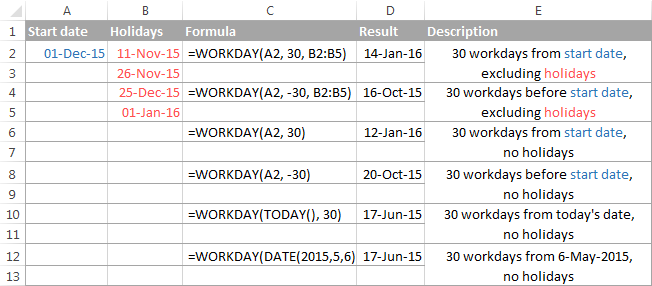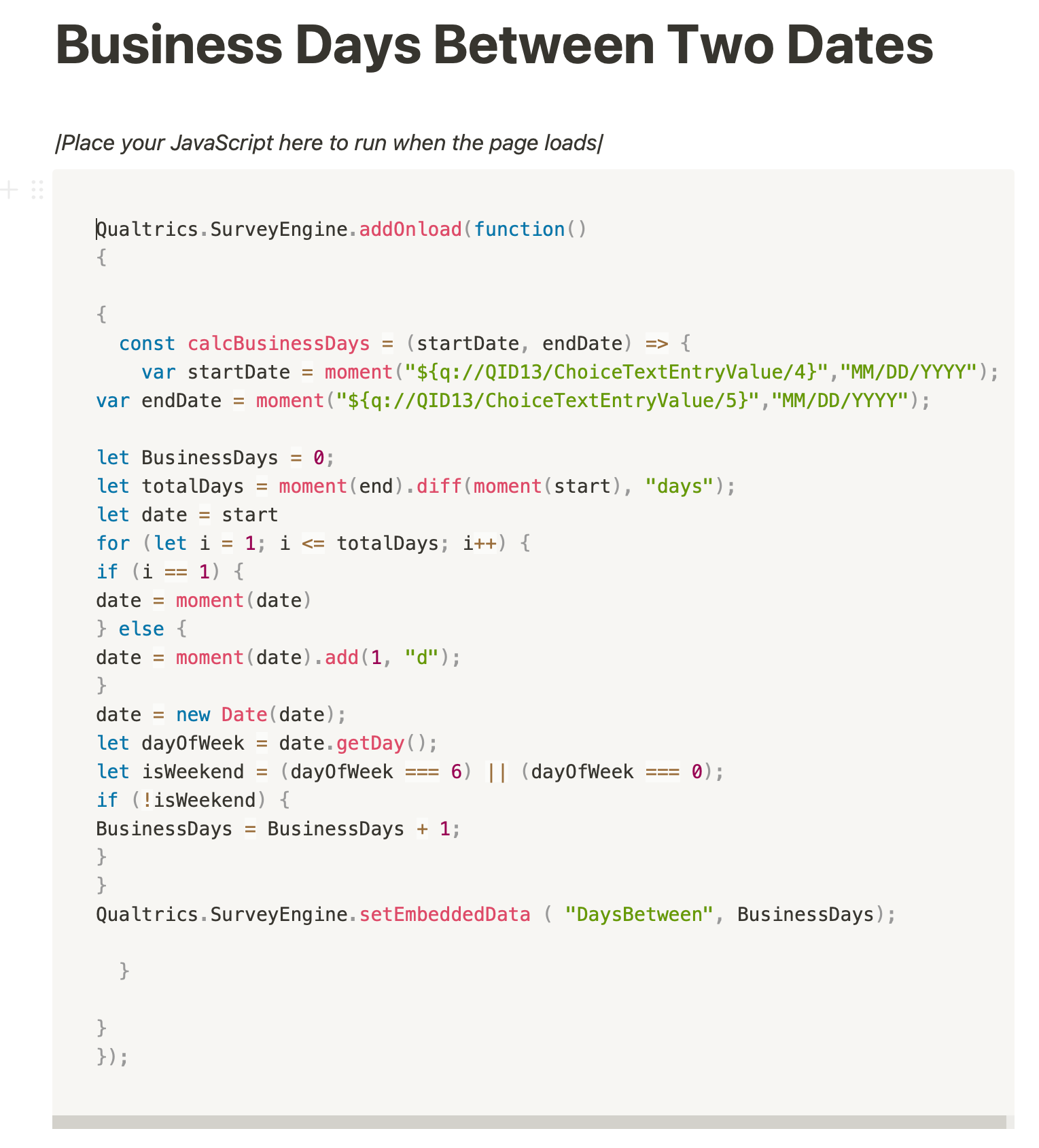To calculate the number of US business days between two dates, exclude weekends and public holidays. Use a business day calculator for accuracy.
Understanding the number of business days between dates is crucial for project planning, deadline management, and scheduling business activities. It’s essential for professionals to have an accurate count to ensure timely delivery of services and avoid miscommunication. This calculation can impact workflow, client relationships, and overall business efficiency.
Tools designed to compute this can save time and increase productivity by providing quick and reliable results. They take into account federal holidays and are tailored to the standard Monday to Friday workweek, helping you plan effectively.

Credit: www.ablebits.com
Introduction To Business Days
Understanding business days is crucial in today’s fast-paced commercial world. Business days refer to the standard days of the week when typical business activities occur. These days exclude weekends and public holidays, which vary by country and region.
The Concept Of Business Days
A business day is any official working day. Monday through Friday, except for legal holidays, are generally considered business days. The start and end of the business day can vary, but it typically aligns with the standard working hours of 9 to 5.
- Five days a week: Monday to Friday.
- Excludes holidays: Public and bank holidays are not business days.
- Varies by location: Business days differ globally due to cultural and regional differences.
Importance In Commercial Operations
The role of business days in commercial operations is substantial. They dictate the timing for transactions, deliveries, and deadlines. Every business and consumer needs to calculate business days for efficient planning and operations.
| Aspect | Significance |
|---|---|
| Transactions | Payment processing aligns with business days. |
| Deliveries | Shipping schedules are based on business days. |
| Deadlines | Project timelines and contracts specify business days. |
Us Business Days Explained
Understanding US business days is key in planning and scheduling. It affects deadlines, project timelines, and more. Let’s dive into what counts as a business day in the United States.
Typical Workweek Structure
The usual business week runs from Monday to Friday. Each day typically consists of 8 work hours, starting from around 9 AM to 5 PM. This is important for calculating the total number of business days between two dates.
- Monday: First day of the workweek
- Tuesday: Second business day
- Wednesday: Mid-week business operations
- Thursday: Fourth business day
- Friday: Last day before the weekend
Public Holidays And Business Days
Public holidays are not counted as business days. This can affect how many business days are found between two dates.
| Holiday | Date | Day of the Week |
|---|---|---|
| New Year’s Day | January 1 | Varies |
| Independence Day | July 4 | Varies |
| Thanksgiving Day | Fourth Thursday in November | Thursday |
| Christmas Day | December 25 | Varies |
Remember, when a holiday falls on a weekend, it may be observed on the nearest weekday. This changes the number of business days in that week.
Calculating Business Days
Understanding how to calculate business days between two dates is essential in the professional world. It helps in planning, setting deadlines, and managing expectations. This guide explains simple ways to calculate business days manually and introduces convenient online tools.
Manual Calculation Methods
Counting business days by hand can be straightforward. Here’s how:
- Start with the day after your initial date.
- Count each day on a calendar, skipping weekends.
- Skip public holidays recognized in your region.
- Stop counting on the day before your end date.
For accurate results, keep a list of holidays handy. You can also use a calendar to mark and count the days.
Online Business Day Calculators
Online calculators simplify the process. Follow these steps:
- Find a reliable business day calculator online.
- Input the start and end dates.
- Specify your region to account for local holidays.
- Click “Calculate” to get the number of business days.
These tools automatically skip weekends and holidays, providing quick and accurate results. They are ideal for those who need to calculate business days regularly.
Factors Affecting Business Days
Calculating business days between two dates isn’t always straightforward. Various factors can change the number of working days. Let’s explore some key elements that can affect this count.
Federal And State Holidays
Holidays can significantly impact business days. Each state observes federal holidays, which most businesses honor by closing. Additionally, state-specific holidays can alter the count depending on location. Here’s a quick look:
| Holiday | Date | Impact |
|---|---|---|
| New Year’s Day | January 1 | National |
| Independence Day | July 4 | National |
| Cesar Chavez Day | March 31 | California Only |
Weather And Unforeseen Events
Weather can also disrupt business operations. Events like snowstorms or hurricanes often lead to unexpected closures. Here are examples of events that might affect business days:
- Snowstorms
- Hurricanes
- Floods
Other unforeseen events include strikes or technical failures. These incidents can halt business activities, thus reducing the number of operational business days.
Always consider these factors when planning or setting deadlines. They ensure accuracy in your date calculations and help manage expectations effectively.
Business Days In Financial Transactions
Business Days in Financial Transactions play a crucial role. They determine when money moves between accounts. They also affect when contracts are in effect. Understanding business days helps plan financial activities better.
Settlement Periods In Finance
When you buy or sell securities, the transaction does not settle immediately. The settlement period is the time between the trade date and the settlement date. It is usually counted in business days. This period allows both parties to fulfill their obligations.
Common settlement periods include:
- T+1, T+2, and T+3 – These are shorthand for one, two, or three business days after the trade date.
- Stocks: Typically settle in T+2.
- Bonds and bank transfers: Can have different settlement periods.
Impact On Contractual Obligations
Contracts often specify obligations based on business days. This affects when payments are due or when actions must be completed.
Examples include:
- Loan payments due within a certain number of business days after invoicing.
- Deliveries scheduled to occur a number of business days after an order is placed.
- Notice periods in employment contracts that start from the next business day.
Understanding the number of business days between two dates is crucial for fulfilling these obligations on time.

Credit: www.journalofaccountancy.com
Tools For Business Day Calculation
Knowing the number of business days between two dates is crucial for planning, deadlines, and scheduling. Various tools simplify this process. They turn a potentially time-consuming task into a quick and error-free calculation. Let’s explore some popular tools.
Software SolutionsSoftware Solutions
Software solutions offer precision and efficiency. These programs can handle complex date calculations with ease. They often include features like:
- Holiday recognition, to exclude public holidays from the count.
- Customizable workweeks, allowing for non-standard business days.
- Integration with other business tools for streamlined workflow.
Some popular software solutions include Microsoft Excel, Google Sheets, and custom ERP systems. Excel, for instance, uses the NETWORKDAYS function, which requires two dates and an optional list of holidays to return the number of working days.
Mobile Apps for On-the-Go CalculationMobile Apps For On-the-go Calculation
For professionals on the move, mobile apps are a lifesaver. These apps provide quick calculations right at your fingertips. Key benefits include:
- User-friendly interfaces, making calculations simple.
- Portability, allowing you to calculate anywhere, anytime.
- Notifications to remind you of important deadlines.
Notable mobile apps for business day calculations are Date Calculator by timeanddate.com and Business Days Calculator. Users can download these from the App Store or Google Play, ensuring easy access across all devices.
Examples Of Business Day Calculations
Understanding the Examples of Business Day Calculations helps in various real-world scenarios. Let’s explore how they apply in different situations.
Project Planning Scenarios
Correct project planning keeps teams on track. It often involves counting business days. Here are common examples:
- Software development: Developers need to estimate time for coding and testing phases.
- Construction projects: Builders calculate the number of working days until project completion.
For instance, if a project starts on March 1 and must finish by March 31, excluding weekends:
| Start Date | End Date | Business Days (Mon-Fri) |
|---|---|---|
| March 1, 2023 | March 31, 2023 | 23 days |
Shipping And Delivery Estimates
Online shoppers and businesses often calculate expected delivery times based on business days. Here are typical examples:
- E-commerce: Sellers provide delivery dates to manage customer expectations.
- Supply chain operations: Companies plan for inventory restock based on supplier timelines.
Consider an order placed on April 15, with a 5 business day delivery promise:
- Day 1: April 17 (Monday)
- Day 2: April 18 (Tuesday)
- Day 3: April 19 (Wednesday)
- Day 4: April 20 (Thursday)
- Day 5: April 21 (Friday)
The package arrives by April 21.

Credit: community.qualtrics.com
Common Misconceptions
When planning projects or deadlines, counting business days is crucial. People often get confused about the number of business days between two dates. This confusion stems from common misconceptions about what counts as a business day.
Weekends As Business Days
One widespread misconception is that weekends can sometimes count as business days. This is not the case. Business days only include Monday through Friday, excluding weekends. Here’s a clear breakdown:
- Monday to Friday: Counted as business days.
- Saturday and Sunday: Not counted as business days.
International Differences In Business Days
Another area where misconceptions arise is international business days. Different countries have varying definitions of a business day. Some countries may include Saturdays as business days, while others may not. Consider these points:
| Country | Business Days |
|---|---|
| USA | Monday to Friday |
| Saudi Arabia | Sunday to Thursday |
| India | Monday to Saturday |
When calculating business days for international dealings, always check the specific country’s business week. This ensures accurate scheduling and avoids missed deadlines.
Tips For Accurate Calculations
Calculating business days between two dates requires precision. For business planning, shipping, or project timelines, accuracy is key. Below are essential tips to ensure precise calculations.
Accounting For Leap Years
Leap years add an extra day to the calendar. This can affect business day calculations, especially when spanning multiple years. Remember, leap years occur every four years. To account for leap years:
- Check the year. If it’s divisible by four, it’s likely a leap year.
- Adjust your count. Add one extra day if the period includes February 29.
Considering Time Zones
Time zones can complicate day counts. A business day in one time zone may not align with another. For accurate calculations:
- Determine the time zones for both dates.
- Use a time zone converter to align dates.
- Count only the overlapping business hours.
Consider using online calculators for help. They can adjust for time zones automatically.
Legal Implications Of Business Days
The concept of ‘business days’ is crucial in the professional world. Not only do these days dictate the pace of commerce, but they also carry significant legal weight. Understanding the legal implications of business days helps businesses avoid costly mistakes and maintain smooth operations.
Contractual Deadlines
Business days directly impact contractual obligations. Agreements often specify actions must occur within a set number of business days. This precision prevents misunderstandings related to deadlines.
- Payment Terms: Invoices typically require payment within a certain number of business days.
- Delivery Schedules: Products or services must be delivered within the agreed business days.
- Notice Periods: Contracts often require notices to be given a specific number of business days in advance.
Failing to comply with these deadlines can lead to breaches of contract. This may result in penalties, legal disputes, or loss of trust.
Regulatory Compliance
Business days also define the timeline for regulatory compliance. Companies must follow strict schedules for submitting reports, payments, and other regulatory documents.
| Regulatory Task | Deadline (Business Days) |
|---|---|
| Tax Filings | Varies by jurisdiction |
| Licensing Renewals | Typically annual |
| Compliance Reports | Depends on industry |
Non-compliance can result in fines, sanctions, or legal action. Adhering to business day deadlines ensures regulatory obligations are met.
Frequently Asked Questions
How To Calculate The Number Of Business Days Between Two Dates In Excel?
Use the NETWORKDAYS function in Excel to calculate business days. Enter =NETWORKDAYS(start_date, end_date, [holidays]) in a cell, replacing start_date and end_date with your dates. Optional: Add a list of holidays to exclude.
How To Calculate Business Days?
To calculate business days, exclude weekends and public holidays from the total number of days between two dates. Use a business day calculator or count manually for accuracy.
How Many Us Business Days Are There?
There are typically 260 US business days in a year, excluding weekends and federal holidays.
Can You Calculate Number Of Days Between Two Dates?
Yes, you can calculate the number of days between two dates using various methods. Online calculators, spreadsheet software like Microsoft Excel, or manual counting are common options. Each method provides a quick and accurate result.
Conclusion
Calculating business days between two dates is crucial for effective planning and scheduling. Use the tips and tools we discussed to streamline your approach. Remember, each business day counts when meeting deadlines and boosting productivity. Check back for more insights on optimizing your time management strategies.
 Sotto TV Sotto TV বাংলাদেশের একটি জনপ্রিয় ওয়েব পোর্টাল। যেখানে টেকনোলজি,বিভিন্ন ধরনের টিপস,ক্যারিয়ার টিপস,ব্যাংকিং ইনফর্মেশন, অনলাইনে আয় করার পদ্ধতি এবং সাম্প্রতিক সময়ে ঘটে যাওয়া সকল আপডেট তথ্য প্রকাশ করা হয়।
Sotto TV Sotto TV বাংলাদেশের একটি জনপ্রিয় ওয়েব পোর্টাল। যেখানে টেকনোলজি,বিভিন্ন ধরনের টিপস,ক্যারিয়ার টিপস,ব্যাংকিং ইনফর্মেশন, অনলাইনে আয় করার পদ্ধতি এবং সাম্প্রতিক সময়ে ঘটে যাওয়া সকল আপডেট তথ্য প্রকাশ করা হয়।



